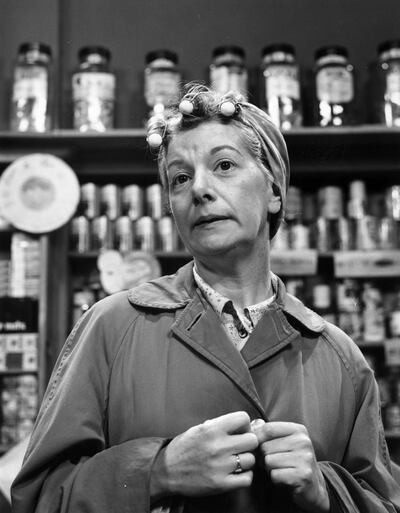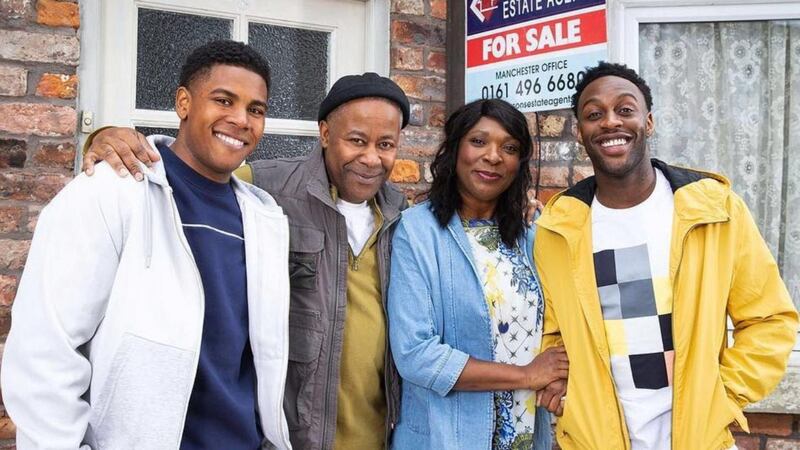In a move that is long "overdue", according to the show's producer, a black family has been introduced into the plot of the world's longest-running soap opera.
Britain's Coronation Street has chronicled the lives of working-class families and individuals in the fictional town of Weatherfield – which is based on the industrial city of Salford near Manchester, England – since 1960. Fifty-nine years later and only one of those families has been black.
"Say hello to the Bailey family." the ITV television show's producers said on Saturday, when they announced the arrival of the new cast members. "A brand new family moving to Weatherfield in June this year!"
Meet the Baileys
The Baileys family is made up of dad Ed, mum Aggie, and two sons, Michael and James. Ed (short for Edison) is a property developer turned builder, a "no-nonsense kind of bloke who has made his own way in life" and is always "up for a laugh".
Aggie is a pharmacy assistant, who is "friendly, fun and outrageous in equal measures"; a woman whose energy her husband "never stops complaining about", despite being "deeply in love" with her.
Meanwhile, elder son Michael, 27, is "full of big ideas and get-rich-quick schemes", is "endlessly optimistic" and has a "cheeky-chappy charm".
Good-looking brother and talented footballer James, 19, is "more brooding" than Michael, as well as more "quiet, modest and hard-working".
"The audience is going to love them," said producer Iain MacLeod. "They're funny, warm and will pull together through thick and thin as we play out the stories we've got lined up for them."
Actor Trevor Michael Georges, who plays Ed, and has previously starred in shows such as Holby City and Doctor Who, also commented: "I have never allowed myself to imagine being part of such a massive icon in television history. I grew up with Ena Sharples, Stan and Hilda Ogden, and Elsie Tanner. As did my family, my neighbourhood and the entire country."
Lorna Laidlaw (Doctors), who will play Aggie, added that the show is "the meat and two veg of the nation's soap diet. A staple, that has been a part of my family for more years than I care to remember."
'It did feel sort of overdue'
The ITV announcement did not address the characters' race or ethnicity, but the British television network did confirm it would be the show's first black family. The show has, in the past, had individual characters who are black or members of other racial groups.
Unsurprisingly, people were shocked it's taken the show nearly six decades to introduce a family that represents such a large portion of the UK population. MacLeod himself commented on the situation to ITV News, saying, "Manchester has a large proportion of black residents, so it did feel sort of overdue we did this and represented modern Manchester a bit more accurately."
Ken Barlow, Ena Sharples, Dennis and Elsie Tanner, Albert Tatlock: these are just a few of the names of the original, all-white cast that appeared on British television screens back in December, 1960, when the first-ever episode of "Corrie" aired.

'Out of touch'
British TV shows, in contrast to American soap operas, are designed to be more relatable, depicting real-life issues, from the challenges of living in poverty to kids dealing with bullying and single parents raising children.
In recent years, however, unrealistic and increasingly out-of-touch plot lines have been criticised, and viewing numbers have dropped over the past decade or so.
In 2007, the "big three" soaps (Coronation Street, Eastenders and Emmerdale) had an average of 8.7 million viewers in total, while in 2017 that figure had decreased to 6.9 million, according to a report by Britain's telecommunications regulator, the Office of Communications.
Public reaction
A number of people have commented in the UK press and on social media about the move. "Crazy it's taken this long," wrote journalist Lorraine King on Twitter.
Coronation Street is getting its first ever black family this summer after 59 years.
— Lorraine King (@lorrainemking) April 6, 2019
Crazy it’s taken this long pic.twitter.com/kwqvAZtUeb
"How have the producers managed to get away with this for almost 60 years?" theatre director Matthew Xia told The Guardian. He added on Twitter: "Did you know that until 2019 Manchester was culturally homogenous?! No? Me neither."
Did you know that until 2019 Manchester was culturally homogenous?! No? Me neither. In 2019 the first black family move into Coronation Street - because the producers have decided to represent contemporary Manchester. After 59 Years! https://t.co/rEiqaLOmka
— Matthew Xia (@Excalibah) April 6, 2019
"No wonder I don't watch soaps. Just not realistic," said another Twitter user.







